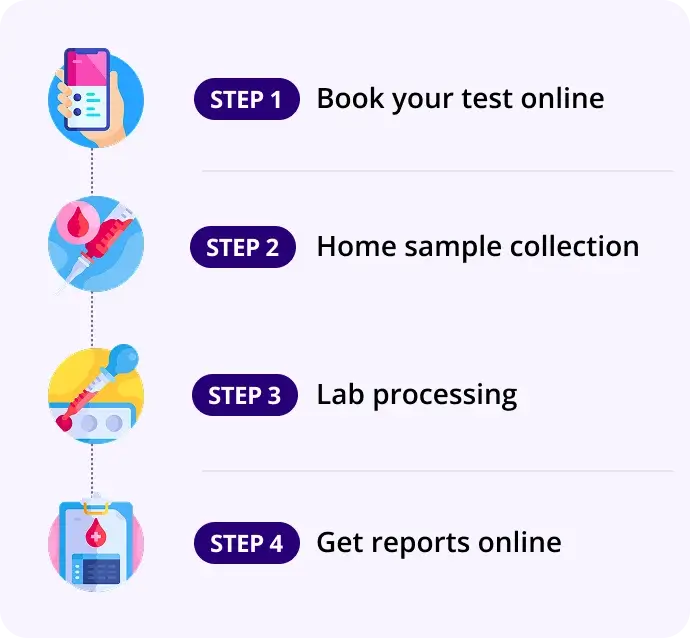Search for
Apolipoprotein - B
Heart
Report in 4Hrs
At Home
Fasting Required
Details
Apolipoprotein B (Apo B) is the primary protein found in atherogenic lipoproteins, including: Low-Density Lipoprotein (LDL), Very Low-Density Lipoprotein (VLDL), Intermediate-Density Lipoprotein (IDL), Lipoprotein(a)
₹269₹495
46% OFF
FREE:
Ai Insights
Apolipoprotein B (ApoB) - Comprehensive Medical Test Information Guide
- Why is it done?
- Measures the primary protein component of low-density lipoprotein (LDL) and very low-density lipoprotein (VLDL) particles, which are carriers of cholesterol in the bloodstream
- Assesses cardiovascular risk by quantifying the number of atherogenic particles rather than just cholesterol levels, providing a more accurate risk assessment than LDL cholesterol alone
- Evaluates risk for atherosclerosis, coronary artery disease, myocardial infarction, and stroke in individuals with conventional lipid abnormalities or borderline cholesterol levels
- Monitors lipid management effectiveness in patients on statin therapy or other lipid-lowering medications
- Identifies individuals with familial hypercholesterolemia or other genetic lipid disorders who are at high risk for premature cardiovascular disease
- Typically ordered during routine health screening, cardiovascular risk assessment, or as part of lipid panel follow-up evaluations
- Normal Range
- Standard Reference Range: Less than 90 mg/dL is considered desirable (optimal) for most individuals; normal values typically range from 50-130 mg/dL depending on laboratory standards
- Units of Measurement: Milligrams per deciliter (mg/dL) or millimoles per liter (mmol/L)
- Interpretation of Results:
- Low ApoB (<50 mg/dL): Very low cardiovascular risk; excellent lipid profile and particle characteristics
- Normal ApoB (50-90 mg/dL): Desirable range indicating lower cardiovascular risk when combined with other lipid parameters
- Borderline-High ApoB (90-110 mg/dL): Elevated risk requiring lifestyle modifications and possible pharmacological intervention
- High ApoB (>110 mg/dL): Significantly increased cardiovascular risk; often associated with increased atherogenic particle number and increased risk for atherosclerotic disease
- Note: Reference ranges may vary by laboratory; always consult the specific laboratory's reference values for accurate interpretation
- Interpretation
- Clinical Significance of Results:
- ApoB is considered superior to LDL cholesterol for cardiovascular risk assessment because it directly counts the number of atherogenic particles; one ApoB molecule is present on each LDL and VLDL particle, making it a more accurate indicator of atherogenic particle burden
- Elevated ApoB indicates increased number of atherogenic particles, which can penetrate the arterial wall and contribute to plaque formation and atherosclerosis development
- Low ApoB levels suggest fewer atherogenic particles in circulation, correlating with reduced atherosclerotic cardiovascular disease risk
- Factors Affecting ApoB Levels:
- Dietary intake: High saturated fat and refined carbohydrate diets increase ApoB; Mediterranean diet may lower levels
- Genetic factors: Familial hypercholesterolemia and other genetic conditions elevate ApoB independent of diet
- Medications: Statins, PCSK9 inhibitors, and other lipid-lowering drugs decrease ApoB; hormone replacement therapy may increase levels
- Metabolic conditions: Obesity, insulin resistance, type 2 diabetes, and metabolic syndrome elevate ApoB
- Physical activity: Regular exercise reduces ApoB levels through improved lipid metabolism
- Smoking and alcohol: Smoking increases ApoB; moderate alcohol consumption may slightly reduce levels
- Kidney disease and hypothyroidism: Can elevate ApoB levels
- Discordance with LDL Cholesterol:
- Some individuals have normal LDL cholesterol but elevated ApoB (pattern B small LDL particles); conversely, some may have elevated LDL but normal ApoB (pattern A large particles), necessitating ApoB measurement for accurate risk stratification
- Associated Organs
- Primary Organ Systems Involved:
- Cardiovascular system: ApoB directly relates to atherosclerotic plaque formation in coronary arteries, carotid arteries, and peripheral vessels
- Liver: Primary site of ApoB synthesis and VLDL particle production; directly influences circulating ApoB levels
- Intestines: Small intestine absorbs dietary cholesterol and produces chylomicrons containing ApoB-48 (the intestinal form of apolipoprotein B)
- Medical Conditions Associated with Abnormal Results:
- Familial hypercholesterolemia (FH): Genetic disorder resulting in markedly elevated ApoB and LDL cholesterol from birth, significantly increasing cardiovascular disease risk
- Type 2 diabetes mellitus: Associated with elevated ApoB levels due to insulin resistance and overproduction of VLDL particles
- Metabolic syndrome: Cluster of conditions including obesity, hypertension, and dyslipidemia; consistently demonstrates elevated ApoB
- Chronic kidney disease: Impaired renal function leads to accumulation of atherogenic VLDL particles and elevated ApoB
- Hypothyroidism: Reduced thyroid hormone decreases LDL receptor expression, leading to elevated ApoB and cholesterol
- Liver disease: Cirrhosis and other hepatic pathology can alter lipid metabolism and ApoB levels
- Coronary artery disease (CAD): Elevated ApoB is an independent risk factor for atherosclerosis and myocardial infarction
- Cerebrovascular disease: High ApoB correlates with increased stroke risk due to carotid atherosclerosis
- Peripheral arterial disease: Elevated ApoB indicates increased atherogenic burden affecting peripheral vessels
- Potential Complications and Risks:
- Myocardial infarction: Persistently elevated ApoB increases risk of acute coronary syndromes
- Acute ischemic stroke: High ApoB contributes to cerebrovascular atherosclerosis and thrombotic events
- Sudden cardiac death: Elevated ApoB and atherogenic particle burden increase arrhythmia risk
- Aortic aneurysm: Chronic elevation of ApoB contributes to vascular wall degradation
- Follow-up Tests
- Additional Tests Based on Elevated ApoB Results:
- Lipid panel (total cholesterol, LDL cholesterol, HDL cholesterol, triglycerides): Comprehensive assessment of lipid abnormalities and overall cardiovascular risk profile
- Apolipoprotein A-I (ApoA-I): Measures the protective HDL-associated protein; helps assess overall particle quality
- ApoB/ApoA-I ratio: Provides comprehensive cardiovascular risk assessment beyond individual measurements
- LDL particle number (NMR or ion mobility): Direct measurement of atherogenic particle count corroborates ApoB findings
- Lipoprotein(a) [Lp(a)]: Independent cardiovascular risk factor that should be assessed alongside ApoB
- High-sensitivity C-reactive protein (hsCRP): Inflammatory marker indicating vascular inflammation and plaque instability
- Fasting glucose and HbA1c: Screen for diabetes mellitus and assess glycemic control
- Comprehensive metabolic panel: Assess liver and kidney function, which affect lipid metabolism
- Thyroid-stimulating hormone (TSH): Rule out hypothyroidism as a cause of dyslipidemia
- Coronary artery calcium (CAC) scoring: CT imaging to assess atherosclerotic burden in asymptomatic individuals
- Carotid ultrasound: Assess intima-media thickness and plaque burden as surrogate for systemic atherosclerosis
- Stress testing or coronary CT angiography: Evaluate for inducible ischemia in patients with multiple risk factors
- Monitoring Frequency for Ongoing Management:
- Initial diagnosis: Repeat ApoB testing 4-12 weeks after initiating lipid-lowering therapy to assess treatment response
- On stable therapy: Annual ApoB monitoring for patients on established lipid-lowering medications
- High-risk patients: Every 6 months for individuals with established cardiovascular disease or very high-risk features
- After medication adjustments: Retest 4-12 weeks following dose changes or addition of new lipid-lowering agents
- Primary prevention: Every 3-5 years in asymptomatic individuals without prior cardiovascular events
- Fasting Required?
- Fasting Status: NO - Fasting is NOT required for ApoB testing. ApoB measurements are relatively stable and unaffected by recent food intake, unlike triglycerides
- Patient Preparation Instructions:
- No dietary restrictions: Patients may eat and drink normally before the test; no fasting period is necessary
- Routine hydration: Adequate fluid intake is encouraged to ensure proper blood volume and easier venipuncture
- Morning appointment: If possible, scheduling tests in morning hours may reduce stress-related variations, though not required
- Wear comfortable clothing: Loose-fitting sleeves facilitate easy access to veins for blood draw
- Medications:
- Continue all regular medications: Do NOT discontinue lipid-lowering medications (statins, PCSK9 inhibitors, ezetimibe, etc.) unless specifically instructed by your physician
- Consistent medication timing: Maintain your regular medication schedule; consistency allows accurate assessment of treatment efficacy
- When Full Lipid Panel Ordered:
- If ApoB is ordered as part of a comprehensive lipid panel that includes triglycerides, fasting MAY be recommended (typically 9-12 hours) to ensure accurate triglyceride measurement, though ApoB itself remains unaffected by fasting status
- Special Considerations:
- Recent illness or stress: Attempt to schedule testing when patient is feeling well; acute illness or significant stress may transiently elevate lipid levels
- Verify with laboratory: Confirm with your specific laboratory regarding any local preferences or special instructions
How our test process works!

